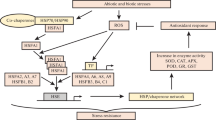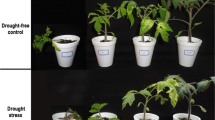Abstract
Rice seedlings accumulate stainable amounts of the 104 and 90 kDa polypeptides in response to high temperature stress. We have purified and raised highly specific polyclonal antisera against both of these polypeptides. In western blotting experiments, we find that these proteins are accumulated to different extents in rice seedlings subjected to salinity (NaCl), water stress, low-temperature stress and exogenous abscisic acid application. These proteins also accumulated when rice seedlings grown in pots under natural conditions were subjected to water stress by withholding watering. Seedlings of Triticum aestivum, Sorghum bicolor, Pisum sativum, Zea mays, Brassica juncea and mycelium of Neurospora crassa showed accumulation of the immunological homologues of both the 104 and the 90 kDa polypeptides, in response to high-temperature stress. We have earlier shown that shoots of rice seedlings exposed to heat shock accumulate a 110 kDa polypeptide which is an immunological homologue of the yeast HSP 104 (Singla and Grover, Plant Mol Biol 22: 1177–1180, 1993). Employing anti-rice HSP 104 antibodies and anti-yeast HSP 104 antibodies together, we provide evidence that rice HSP 104 is different from the earlier characterized rice HSP 110.
Similar content being viewed by others
References
Almoguera C, Coca MA, Jordano J: Tissue-specific expression of sunflower heat shock proteins in response to water stress. Plant J 4: 947–958 (1993).
Atlas RM: Neurospora minimal medium (Neurospora medium). In: Parks LC (ed) Handbook of Microbiological Medium, p. 652. CRC Press, Boca Raton, FL (1993).
Breusegem FV, Dekeyser R, Garcia AB, Claes B, Gielen J, Van Montagu M, Caplan AB. Heat-inducible rice hsp82 and hsp70 are not always co-regulated. Planta 193: 57–66 (1994).
Chandler PM, Robertson M: Gene expression regulated by abscisic acid and its relation to stress tolerance. Annu Rev Plant Physiol Plant Mol Biol 45: 113–141 (1994).
Gething MJ, Sambrook J: Protein folding in the cell. Nature 355: 33–45 (1992).
Hames BD, Rickwood D: Gel Electrophoresis of Proteins: A Practical Approach. IRL Press, London (1981).
Harlow E, Lane D: Antibodies: A Laboratory Manual. Cold Spring Harbor Laboratory, Cold Spring Harbor, NY (1988).
Hernandez LD, Vierling E: Expression of low molecular weight heat-shock proteins under field conditions. Plant Physiol 101: 1209–1216 (1993).
Hurkman WJ, Tanaka CK: Solubilization of plant membrane protein for analysis by two-dimensional gel electrophoresis. Plant Physiol 81: 802–806 (1986).
Kimura Y. Matsumoto S, Yahara I: Temperature-sensitive mutants of hsp82 of the budding yeast Saccharomyces cerevisiae. Mol Gen Genet 242: 517–527 (1994).
Laemmli UK: Cleavage of structural proteins during the assembly of the head of bacteriophage T4. Nature 227: 680–685 (1970).
Lee YRJ, Nagao RT, Key JL: A soybean 100-kD heat shock protein complements a yeast HSP104 deletion mutant in acquiring thermotolerance. Plant Cell 6: 1889–1897 (1994).
Lindquist S: The heat-shock response. Annu Rev Biochem 55: 1151–1191 (1986).
Lindquist S, Craig EA: The heat shock-proteins. Annu Rev Genet 22: 631–677 (1988).
Parsell DA, Kowal A, Singer MA, Lindquist S: Protein disaggregation mediated by heat-shock protein Hsp 104. Nature 372: 475–478 (1994).
Parsell DA, Sanchez Y, Stitzel JD, Lindquist S: Hsp 104 is a highly conserved protein with two essential nucleotide-binding sites. Nature 353: 270–273 (1991).
Roychowdhury HS, Wong D, Kapoor M: hsp80 of Neurospora crassa: cDNA cloning, gene mapping, and studies of mRNA accumulation under stress. Biochem Cell Biol 70: 1356–1367 (1992).
Sanchez Y, Lindquist SL: HSP 104 required for induced thermotolerance. Science 248: 1112–1115 (1990).
Sanchez Y, Taulien J, Borkovich KA, Lindquist S: Hsp 104 is required for tolerance to many forms of stress. EMBO J 11: 2357–2364 (1992).
Schirmer EC, Lindquist S, Vierling E: An Arabidopsis heat shock protein complements a thermotolerance defect in yeast. Plant Cell 6: 1899–1909 (1994).
Schröder G, Beck M, Eichel J, Vetter H-P, Schröder J: HSP90 homologue from Madagascar periwinkle (Catharanthus roseus): cDNA sequence, regulation of protein expression and location in the endoplasmic reticulum. Plant Mol Biol 23: 583–594 (1993).
Singla SL, Grover A: Antibodies raised against yeast HSP104 cross-react with a heat-and abscisic acid-regulated polypeptide in rice. Plant Mol Biol 22: 1177–1180 (1993).
Singla SL, Grover A: Detection and quantitation of a rapidly accumulating and predominant 104 kDa heat shock polypeptide in rice. Plant Sci 97: 23–30 (1994).
Vierling E: The roles of heat shock proteins in plants. Annu Rev Plant Physiol Plant Mol Biol 42: 579–620 (1991).
Walther-Larsen H, Brandt J, Collinge DB, Thordal-Christensen H: A pathogen-induced gene of barley encodes a HSP 90 homologue showing striking similarity to vertebrate forms resident in the endoplasmic reticulum. Plant Mol Biol 21: 1097–1108 (1993).
Author information
Authors and Affiliations
Rights and permissions
About this article
Cite this article
Pareek, A., Singla, S.L. & Grover, A. Immunological evidence for accumulation of two high-molecular-weight (104 and 90 kDa) HSPs in response to different stresses in rice and in response to high temperature stress in diverse plant genera. Plant Mol Biol 29, 293–301 (1995). https://doi.org/10.1007/BF00043653
Received:
Accepted:
Issue Date:
DOI: https://doi.org/10.1007/BF00043653




